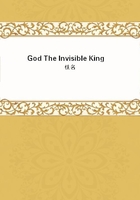
第5章
The modern religious man will almost certainly profess a kind of universalism; he will assert that whensoever men have called upon any God and have found fellowship and comfort and courage and that sense of God within them, that inner light which is the quintessence of the religious experience, it was the True God that answered them.
For the True God is a generous God, not a jealous God; the very antithesis of that bickering monopolist who "will have none other gods but Me"; and when a human heart cries out--to what name it matters not--for a larger spirit and a stronger help than the visible things of life can give, straightway the nameless Helper is with it and the God of Man answers to the call. The True God has no scorn nor hate for those who have accepted the many-handed symbols of the Hindu or the lacquered idols of China. Where there is faith, where there is need, there is the True God ready to clasp the hands that stretch out seeking for him into the darkness behind the ivory and gold.
The fact that God is FINITE is one upon which those who think clearly among the new believers are very insistent. He is, above everything else, a personality, and to be a personality is to have characteristics, to be limited by characteristics; he is a Being, not us but dealing with us and through us, he has an aim and that means he has a past and future; he is within time and not outside it. And they point out that this is really what everyone who prays sincerely to God or gets help from God, feels and believes. Our practice with God is better than our theory. None of us really pray to that fantastic, unqualified danse a trois, the Trinity, which the wranglings and disputes of the worthies of Alexandria and Syria declared to be God. We pray to one single understanding person.
But so far the tactics of those Trinitarians at Nicaea, who stuck their fingers in their ears, have prevailed in this world; this was no matter for discussion, they declared, it was a Holy Mystery full of magical terror, and few religious people have thought it worth while to revive these terrors by a definite contradiction. The truly religious have been content to lapse quietly into the comparative sanity of an unformulated Arianism, they have left it to the scoffing Atheist to mock at the patent absurdities of the official creed. But one magnificent protest against this theological fantasy must have been the work of a sincerely religious man, the cold superb humour of that burlesque creed, ascribed, at first no doubt facetiously and then quite seriously, to Saint Athanasius the Great, which, by an irony far beyond its original intention, has become at last the accepted creed of the church.
The long truce in the criticism of Trinitarian theology is drawing to its end. It is when men most urgently need God that they become least patient with foolish presentations and dogmas. The new believers are very definitely set upon a thorough analysis of the nature and growth of the Christian creeds and ideas. There has grown up a practice of assuming that, when God is spoken of, the Hebrew-Christian God of Nicaea is meant. But that God trails with him a thousand misconceptions and bad associations; his alleged infinite nature, his jealousy, his strange preferences, his vindictive Old Testament past. These things do not even make a caricature of the True God; they compose an altogether different and antagonistic figure.
It is a very childish and unphilosophical set of impulses that has led the theologians of nearly every faith to claim infinite qualities for their deity. One has to remember the poorness of the mental and moral quality of the churchmen of the third, fourth, and fifth centuries who saddled Christendom with its characteristic dogmas, and the extreme poverty and confusion of the circle of ideas within which they thought. Many of these makers of Christianity, like Saint Ambrose of Milan (who had even to be baptised after his election to his bishopric), had been pitchforked into the church from civil life; they lived in a time of pitiless factions and personal feuds; they had to conduct their disputations amidst the struggles of would-be emperors; court eunuchs and favourites swayed their counsels, and popular rioting clinched their decisions. There was less freedom of discussion then in the Christian world than there is at present (1916) in Belgium, and the whole audience of educated opinion by which a theory could be judged did not equal, either in numbers or accuracy of information, the present population of Constantinople. To these conditions we owe the claim that the Christian God is a magic god, very great medicine in battle, "in hoc signo vinces," and the argument so natural to the minds of those days and so absurd to ours, that since he had ALL power, all knowledge, and existed for ever and ever, it was no use whatever to set up any other god against him. . . .